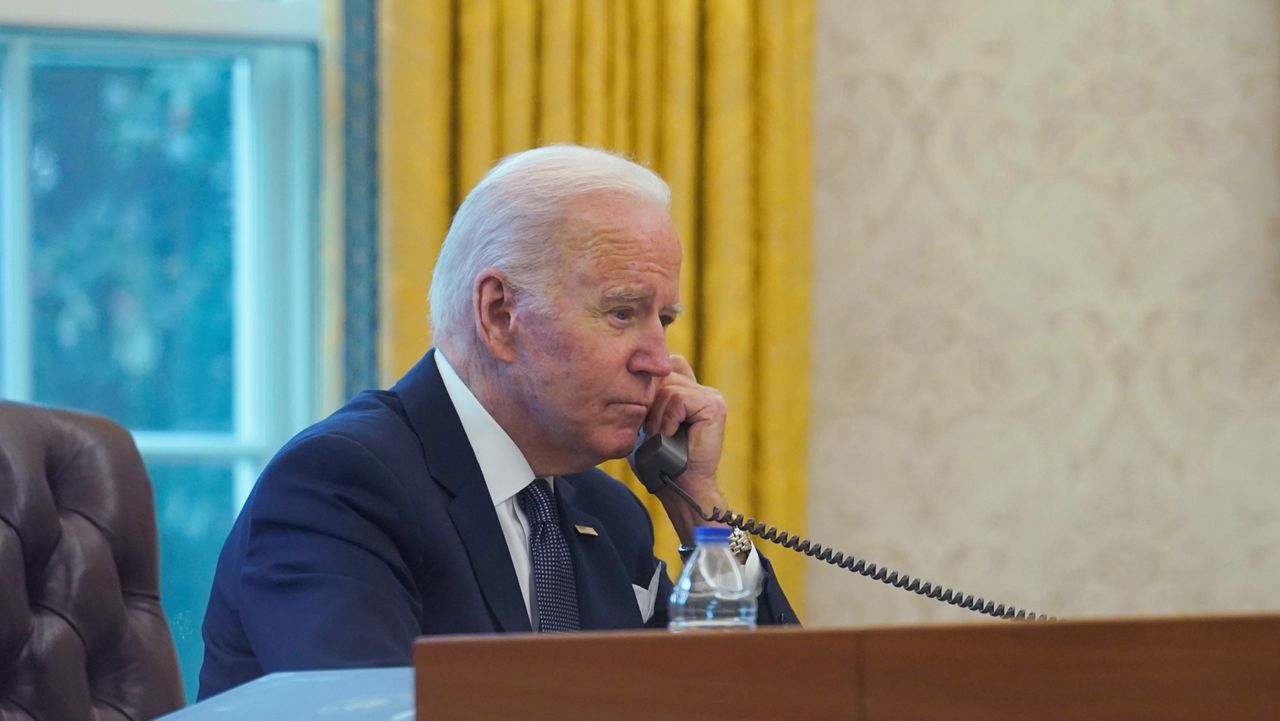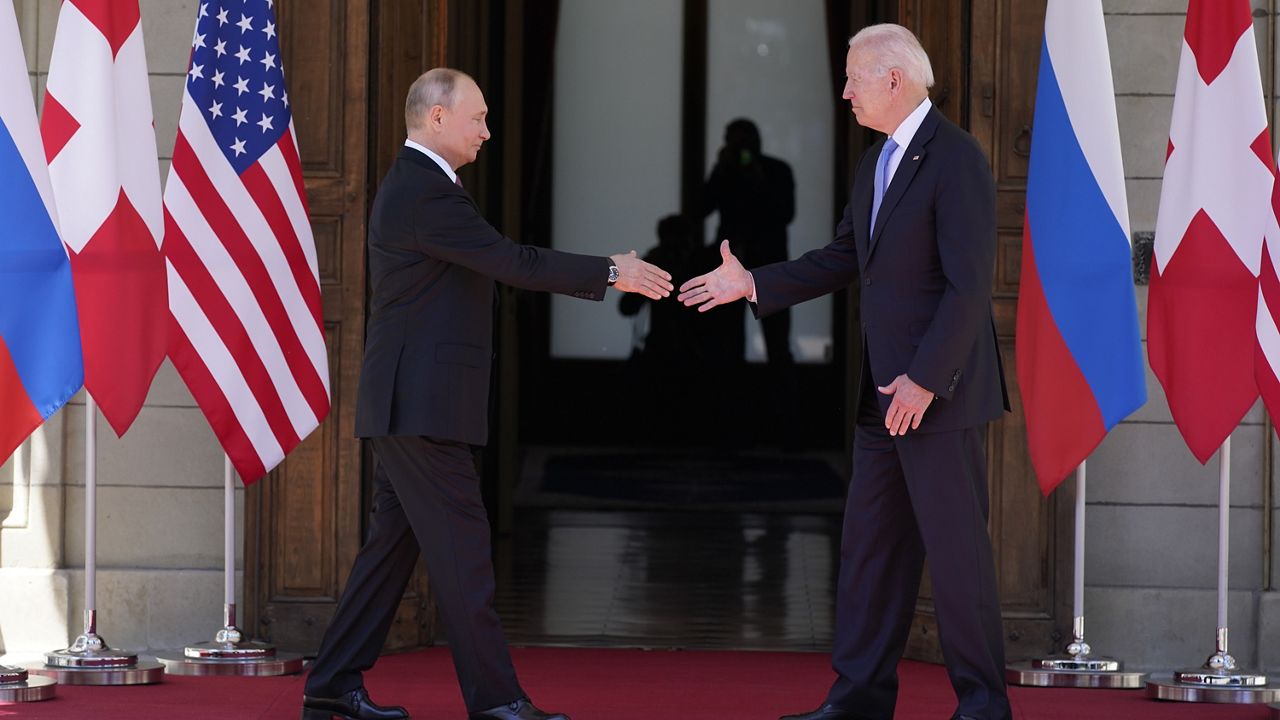In a phone conversation with Ukraine's President Volodymyr Zelensky on Thursday, President Joe Biden sought to reaffirm the United States' commitment to Ukraine's sovereignty and territorial integrity amid mounting Russian aggression and fears of a possible military invasion.
“President Biden voiced the deep concerns of the United States and our European Allies about Russia’s aggressive actions towards Ukraine and made clear that the U.S. and our Allies would respond with strong economic and other measures in the event of a further military intervention,” according to a White House readout of the call, which comes just days after Biden’s high-stakes video meeting with Russian President Vladimir Putin.
Speaking to reporters Thursday, a senior administration official characterized the Biden-Zelensky call, which lasted roughly 90 minutes, as “very warm.”
“The main purpose of the call was an opportunity for President Biden to give President Zelensky a readout of his phone conversation with President Putin,” the administration official said, adding that it was “very important to Biden that he call and follow up with Zelensky personally" after his Tuesday call with Putin.
The two leaders first spoke by phone in April to discuss Ukraine’s concerns over concerns of a Russian military build-up. And in September, Zelensky traveled to the White House to meet with President Biden face-to-face — the result of a years-long quest by Zelensky that began when he first took office in 2019.
On Thursday, White House officials said, Biden and Zelensky urged diplomacy, and called on Putin to calm the mounting aggression on Ukraine’s eastern flank. Biden also said the U.S. was prepared to help with “confidence-building measures” in order to implement a 2015 peace deal.
Biden told Zelensky, “as he has told Putin, that if Russia further invades Ukraine, the U.S. and our European allies would respond with strong economic measures; provide additional defensive materials to Ukraine, and fortify our NATO allies on the eastern flank with additional capabilities,” a senior administration official said.
“I think President Biden has made very clear that he stood by our principles,” this official added. “He made very clear that one nation can't force another nation to change its border. One nation cannot tell another to change its politics. And nations can't tell others who they can work with. President Biden underscored those points that he made to Putin and made very clear to President Zelensky that that was a key message of his call.”
In Biden's conversation with Putin earlier this week, the president expressed deep concerns related to Russia’s escalation of troops near various points along the Ukrainian border, and warned Putin that the U.S. and its allies "would respond with strong economic and other measures” in the event of military escalation.
“The President of the United States informed me of the content of his negotiations with Putin,” Zelensky said Thursday following his discussion with Biden. “We also discussed possible formats for resolving the conflict in Donbas and touched upon the course of internal reforms in Ukraine.”
Biden also sought to reassure Zelensky that the U.S. is “committed to the principle of ‘no decisions or discussions about Ukraine without Ukraine,” officials said.
Biden made “very clear that, ‘if Ukraine is on the agenda, then Ukraine is at the table.’”
The administration said it has also made a clear effort to engage with allies and partners on “key security issues” before and after Biden’s call with Putin, a strategy it used also used in the run-up to the summer summit in Geneva.
To that end, U.S. Secretary of State Antony Blinken spoke Wednesday to E.U. President Charles Michel and NATO Secretary General Stoltenberg for follow-up discussions on the Biden-Putin call, officials said. He also spoke by phone to Zelensky on Monday ahead of the Biden-Putin call.
Following his own conversation with Zelensky on Thursday, Biden spoke by phone to members of the “Bucharest Nine,” a group of countries on the eastern flank of the NATO military alliance that includes Romania, Bulgaria, Czech Republic, Hungary, Slovakia, Poland, Estonia, Latvia and Lithuania.
Biden briefed them on his call with Putin, the White House said, and solicited their “perspectives on the current security situation” in the region.
Biden also sought to address broader concerns along the eastern flank: “In addition to what we have been seeing, in terms of the worrying buildup of Russian forces on Ukraine's border, [Biden] also made clear that these threats are bigger than Ukraine, and reaffirmed his very strong support to transatlantic security, and reiterated … the sacred commitment” to transatlantic security, to NATO, “and especially to our eastern flank allies.”
Before and after his call with Putin, Biden also spoke to the leaders of Britain, France, Germany and Italy. France and Germany took the lead in brokering the 2015 peace deal between Ukraine and the Russia-backed rebels.
“We hope by Friday we’re gonna be able to say, announce to you, we’re having meetings at a higher level,” Biden told reporters Wednesday. “Not just with us, but with at least four of our major NATO allies, and Russia.”
The meetings would address “the future of Russia’s concern relative to NATO writ large, and whether or not we could work out any accommodations as it relates to bringing down the temperature” in Ukraine’s east,” Biden said.
The Associated Press contributed to this report.





